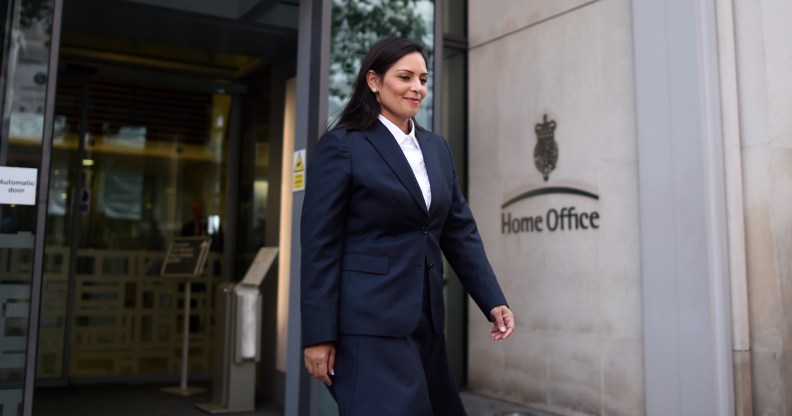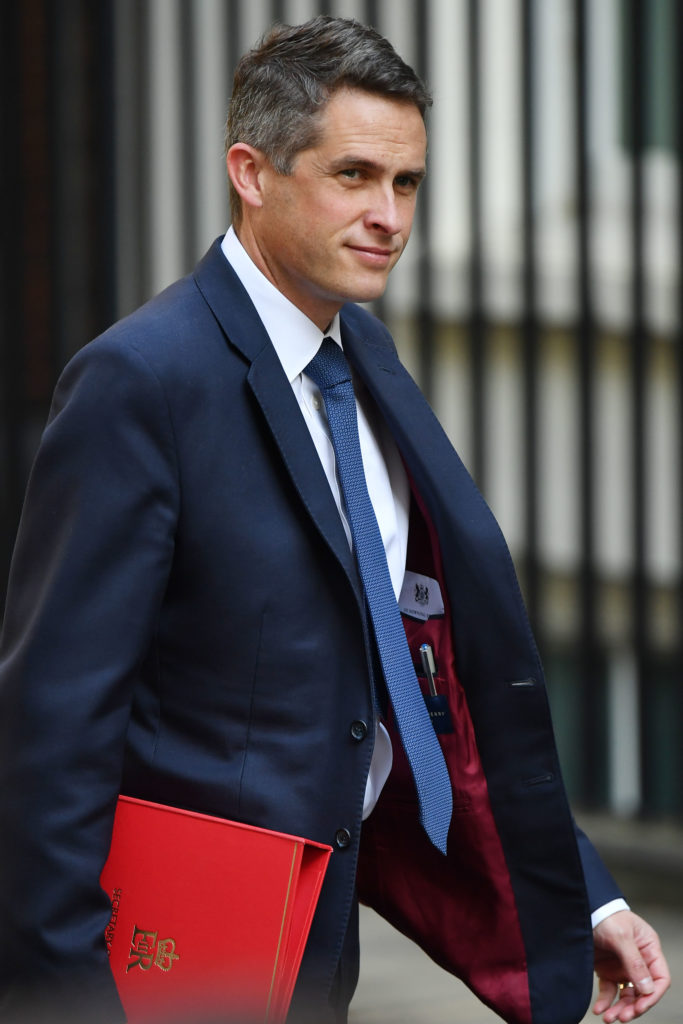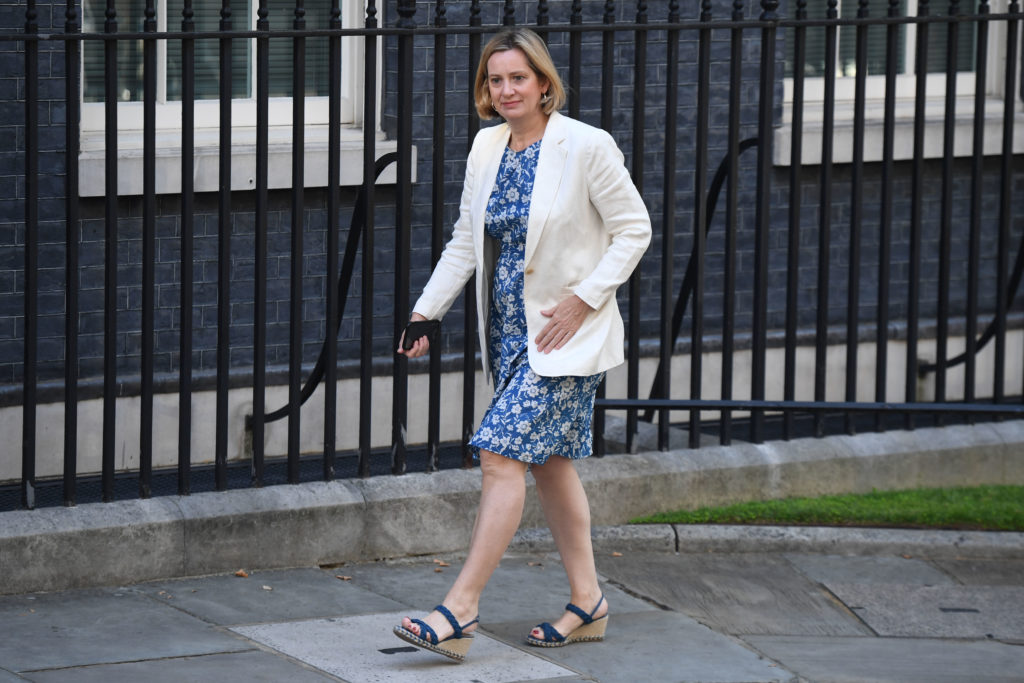New home secretary Priti Patel urged to reform LGBT asylum

Home Secretary Priti Patel outside the Home Office. (Peter Summers/Getty)
Priti Patel, the new home secretary, has been urged to reform immigration policies to better protect LGBT+ people seeking asylum in the UK.
Prime Minister Boris Johnson has assembled a new cabinet that will collectively take charge of the UK’s LGBT+ rights, with Patel taking responsibility for immigration, counter-terrorism, drug policy and policing.
Her appointment was met with trepidation from human rights groups concerned over her voting record and history in government.
Clare Collier, advocacy director at the human rights group Liberty, told the Guardian: “Priti Patel is a politician with a consistent record of voting against basic human rights protections. For her to be put in charge of the Home Office is extremely concerning.”
The UK Lesbian & Gay Immigration Group has urged Patel “to ensure the Home Office is not overly demanding of people to prove that they are at risk of persecution because they are LGBT+.”
“There needs to be an end to stereotyping of ‘coming out journeys’ and an end to holding LGBT+ people in immigration detention centres,” a spokesperson told PinkNews.
The Peter Tatchell Foundation said it is hopeful that the new home office will reform the asylum system to create a safe haven for LGBT+ refugees.
For Priti Patel to be put in charge of the Home Office is extremely concerning.
“Victims of anti-LGBT+ criminalisation, violence and discrimination come to the UK to claim asylum, only to find the asylum system is stacked against them,” the charity wrote in a statement.
“They are sometimes locked up in immigration detention centres, routinely disbelieved even when they produce evidence of persecution, and banned from working while their asylum claims are processed, which can take many years, despite many of them having employment skills that the UK needs. These injustices have to change.”
Patel previously served as UK international development secretary. She was forced to resign in November 2017 after taking unauthorised meetings with Israeli officials during a private holiday.
Prior to the introduction of equal marriage, Patel repeatedly voted against same-sex marriage in parliament. She has also previously expressed support for capital punishment, telling BBC Question Time in 2011 that the reintroduction of the death penalty would “act as a deterrent.”
By 2016, Patel had reversed this stance.
What will Boris Johnson’s new cabinet mean for LGBT+ rights?
After Johnson walked in to 10 Downing Street for the first time on Wednesday (July 24), he promptly sacked most of Theresa May’s cabinet in favour of his own band of allies, promoting Sajid Javid to chancellor and naming Dominic Raab foreign secretary.
Gavin Williamson was named the new education secretary at a time when the debate around LGBT-inclusive teaching continues to rage.
Political pundit Owen Jones shared his displeasure at the appointment, tweeting: “Gavin Williamson has actively opposed LGBTQ rights time and time again. He’s now education secretary at a time when LGBTQ inclusive education is threatened.”
Williamson’s voting record shows that he opposed the introduction of equal marriage in 2013 and voted against a bill to extend same-sex marriage to armed forces personnel outside of the UK in 2014.

Gavin Williamson arrives at 10 Downing Street. (Jeff J Mitchell/Getty)
However while serving as defence secretary in 2019, he called for a change in law to allow LGBT+ service people to marry on military bases.
Williamson was dismissed from the defence role in May, having been accused of leaking plans to allow Huawei to build the UK’s 5G network. He has denied being responsible for the leak.
In his new post, Williamson will be expected to respond to the widespread protests against LGBT-inclusive education which have been taking place outside of schools in Birmingham.
His predecessor Damian Hinds was vocal in his disproval of the demonstrations, telling ITV News: “All children of all ages should know about relationships and should be respectful of other people’s relationships.”
Also appointed to the cabinet were Andrea Leadsom and Esther McVey, as business secretary and housing minister respectively. Both women have been criticised for defending the rights of parents to remove their children from inclusive relationship lessons.
Amber Rudd takes charge of gender reform
Amber Rudd has been reinstated as minster for women and equalities, having previously held the role for a short while in 2018.
When first appointed to the post in January 2018, the then-home secretary pledged her support for reforms to the Gender Recognition Act, including the introduction of self-identification.
“As a country, we have come a long way in terms of lesbian, gay and bisexual equality. I now want to see the same national determination for transgender people,” she wrote on her website at the time.

Amber Rudd arrives at 10 Downing Street. (Chris J Ratcliffe/Getty)
Rudd quit the government in April 2018, at the height of the Windrush scandal, after she “inadvertently misled” MPs over targets for removing illegal migrants.
Her equalities title was taken up by Penny Mordaunt, who recently told PinkNews that GRA reforms would be announced within the coming weeks.
Other major appointments to the cabinet include Michael Gove as chancellor of the Duchy of Lancaster, and Jacob Rees-Mogg, who has repeatedly said that he opposes same-sex marriage, as leader of the House of Commons.

